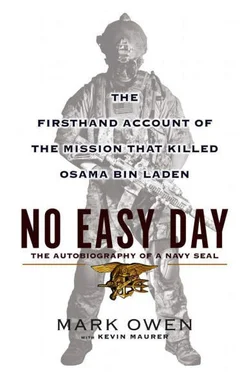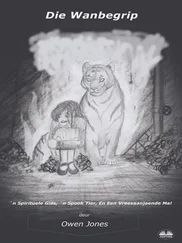“Ha-ha,” I said. “Good to see you guys too.”
I was looking forward to leave and then a trip to Mississippi to shoot. I knew the only chance I had to shut them up was on the range. Even though we’d all just gotten home, we weren’t scheduled to stay long. Two weeks of leave is all we had before heading out to train. It was a cycle we would repeat for almost a decade.

CHAPTER 5
Point Man
In December 2006, we were deployed to western Iraq. It was my third deployment at the command. I had spent one rotation working closely with the CIA. It felt good to be back with the guys instead of helping the agency plan and train their Afghan fighters. We worked with a lot of other units, but it was always better with the boys because we were cut from the same cloth.
My troop was working along the Syrian border and in some of Iraq’s nastiest towns like Ramadi, home to al Qaeda Iraq. Our job was to target high-level couriers that brought in foreign fighters and Iranian weapons.
The Marines in Al Anbar asked if we could help conduct an operation to clear and secure a series of houses in a village near the Syrian border. The village was a safe haven for insurgents, and several leaders were staying near the center of the town. The plan was for us to hit the houses at night and then the Marines would surround the village and relieve us in the morning.
Even with the team crowded into a Black Hawk, I was fighting to keep warm.
We had a combat assault dog with us. We used it to detect bombs and help track enemy fighters. I tried to get the dog to sit on my lap to warm me up. Every time I got him close to me, the handler would pull him away.
It was freezing when we landed about four miles from the Iraqi village. Shielding my eyes from the dust, I waited for the helicopters to leave. I could hear their engines fade away minutes later, heading east back toward Al Asad Air Base.
I stamped my feet and rubbed my hands together trying to get the circulation moving while we got organized to move out.
Even though I’d been to Iraq twice before, this third deployment was different. The enemy had evolved. So, like SEALs do best, we adapted. Instead of flying to the X like we did in the past, we’d started to land miles away and patrol in quietly. This way the enemy couldn’t hear the helicopters. We were transitioning from being loud and fast, taking the enemy by surprise, to being soft and slow and retaining the element of surprise for even longer. We could creep through their houses and into their bedrooms and wake them up before they had a chance to fight back.
But patrolling to the target wasn’t easy, especially in the cold winter night. The wind cut into our uniforms as we moved toward the village. I was near the front, acting as the point man for my team.
One of the key lessons learned early on in a SEAL’s career was the ability to be comfortable being uncomfortable. It was a lesson I first learned as a kid in Alaska checking the trap line with my dad.
When it got cold in Iraq or during Hell Week in BUD/S, my mind used to wander back to Alaska. I could always hear the roar of the snowmobile as my father and I headed toward the line of traps he kept miles from the village and deep into Alaska’s wilderness.
I remember how it felt like the snowmobile was floating through the fresh powder, and how as we turned it was like being on a surfboard cutting into a wave. The temperature hovered near zero, and our warm breath crystallized in the air.
On one cold winter day in Alaska, I was wrapped tightly in a tan Carhartt snowsuit, winter boots, and gloves. A beaver hat hand-sewn by my mother covered my ears and a scarf protected my face, leaving only my eyes exposed. I was warm except for my hands and feet. We’d been out for hours and I could barely feel my toes.
I tried to wiggle them in my thick wool socks, but it wasn’t helping. Huddled behind my father to block the wind, all I could think about was how cold my hands and feet were. We’d already gotten a couple of marten, a cat-size weasel with a bushy tail like a squirrel and a soft coat of brown fur. My father traded the pelts in the village to make a little extra money or my mother would make hats for my sisters.
But the biting cold took the thrill out of the time I was spending with my dad. Any fun I was having disappeared with the last feeling of warmth in my body.
I’d begged my father to go on the trip.
“Are you sure?” he said. “You know it is going to be cold.”
“I want to go,” I said.
I wanted to hang out with my father and didn’t want to be stuck back at the house. This was guy stuff, and he taught me how to shoot and hunt. As I got older, he trusted me to hunt and fish on my own, and I’d take the family boat up the river for a week at a time. In a way, it was my first taste of “Big Boy Rules” and I thrived. Plus, I wouldn’t have to sit at home with the girls.
I always wanted to be outside. I loved the outdoors, just not all the cold weather. I knew that if my dad let me come with him I couldn’t be the kid complaining about the cold. But now, a few hours into the trip, all I wanted were warm hands and feet.
“Dad,” I screamed into the wind as we drove. “Dad, my feet are frozen.”
My father, dressed in the same snowsuit and hat, slowed to a stop. He turned back and I imagine he saw a small boy with his teeth chattering behind his scarf.
“I’m freezing,” I said.
“We only have a few more traps,” my father said. “Do you think you can make it?”
I just looked at him, not wanting to answer no. I didn’t want to let him down. I stared at him hoping he’d make the choice for me.
“I can’t feel my feet,” I said.
“Get off here and start walking behind the snowmobile. Follow my tracks. I am going to keep going. I won’t be far ahead of you. Stick to the tracks and keep moving because that will keep your feet warm.”
I slid off the back of the snow machine and adjusted the .22 rifle strapped to my back.
“You got it?” my father asked.
I nodded.
He started the engine and headed toward the next trap. I started walking and my feet warmed up.
Outdoorsmen pay thousands of dollars to experience the Alaska tundra, but for most of my childhood all I had to do was walk outside my door.
My family had a sense of adventure not found in most people. When I was five years old, we moved to a small Eskimo village in the interior of Alaska. My parents were missionaries who met in college in California and found that their faith not only allowed them to spread Christianity but also appealed to their sense of adventure.
Besides his missionary work, my father worked for the state. The job required a college degree, and my father was one of the few people in the village that had one.
My mother stayed home with us. She helped with homework and kept my sisters and me on track. I was the middle child between two sisters. We were a tight family because there wasn’t a lot to do in the village. Winters were brutal, so we’d huddle around the kitchen table and play board games.
But calling it a town by normal standards would be generous. We had two stores, together no bigger than a small truck stop, a small school, and a post office. No mall. No movie theater, but you could rent movies at one of the stores. The crown jewel of my town was the runway. It was just large enough to land a 737 jet as well as some of the bigger propeller-driven cargo planes. That made our village the hub of the region. Bush planes would come in and out of town bringing hunters and outdoorsmen from Anchorage to the more remote villages spread along the river.
Читать дальше













